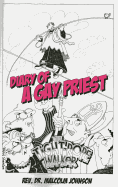 Diary of a Gay Priest: The Tight-Rope Walker
Diary of a Gay Priest: The Tight-Rope Walker
by Rev. Dr. Malcolm Johnson
Christian Alternative Books. 220 pages, $16.95
IN 1969, his marriage of only a few months crumbling all around him, aware at last that his homosexuality was unalterable, Malcolm Johnson went to his Bishop to resign his post as one of the chaplains to the University of London. The Bishop refused his resignation, reasoning that as a college chaplain, “the staff and students of the college would understand and probably not be very interested.” This response tells us a lot about Johnson and the Anglican Church at this time. He doesn’t take himself too seriously and the church is remarkably tolerant as long as things are kept quiet.
Diary of a Gay Priest is one of the funniest and sanest memoirs I’ve ever read, with almost none of the solemnity and religiosity that one might expect. It is a sign of what’s wrong in publishing that the book has come out of an obscure press and will probably not find the readership it deserves.
Johnson was born in Yarmouth, “the boil on England’s eastern cheek,” into a relatively wealthy family of clothing manufacturers. It was a chilly, respectable family that was not at all religiously minded. But his parents seemed to accept the eccentricities of their son, which included an eye for interior design as well as an interest in the homeless and drug-addicted. He came to be called “the pink bishop” not only because he was gay but because of his concerns for social justice.
These concerns were an immediate presence at St. Botolph’s, his first church, located in the poverty-stricken Aldersgate area not far from where Jack the Ripper committed his murders. At St. Botolph he housed the homeless and the Gay Christian Movement, plus a shelter for runaway children. A superb fund-raiser, Johnson opened four group homes as transitional housing and later as hospice for people dying of AIDS. Businesspeople liked working with him because he had a practical mind and kept a keen eye on the books. However, he soon discovered that he was not going to rise up the church hierarchy because he was openly and unapologetically gay.
He was also unafraid of rebelling. Early on, he was a patient of a Jungian analyst who told him not to get a dog because it would be a substitute for a lover. He left her office and went to the pound, where he bought Ben, who became his beloved cocker spaniel. Once, while attending a particularly boring sermon with Johnson, Ben got up, walked to the middle of the church, and vomited. He had read his master’s mind.
Johnson had many famous friends and associates. The Queen Mum was the patroness of his second church, St Katherine’s. She thought the church needed more laughter and color. When she first came to tea, Johnson called up her secretary to see what she ate. “Something stronger than coffee,” he was told: three parts gin to one part vermouth. One day Johnson went to Wippells, the store for clerical clothing, to be measured for shirts. The assistant turned to him and said: “Well, Father, you’re ordinary, normal. Most people in the Church wouldn’t think so, but you are.”
Johnson is now retired and lives with his partner of many decades. He presides over the odd funeral, a ready source of “ash cash,” which he needs in England in this time of austerity.
David Bergman is professor of English at Towson University.





